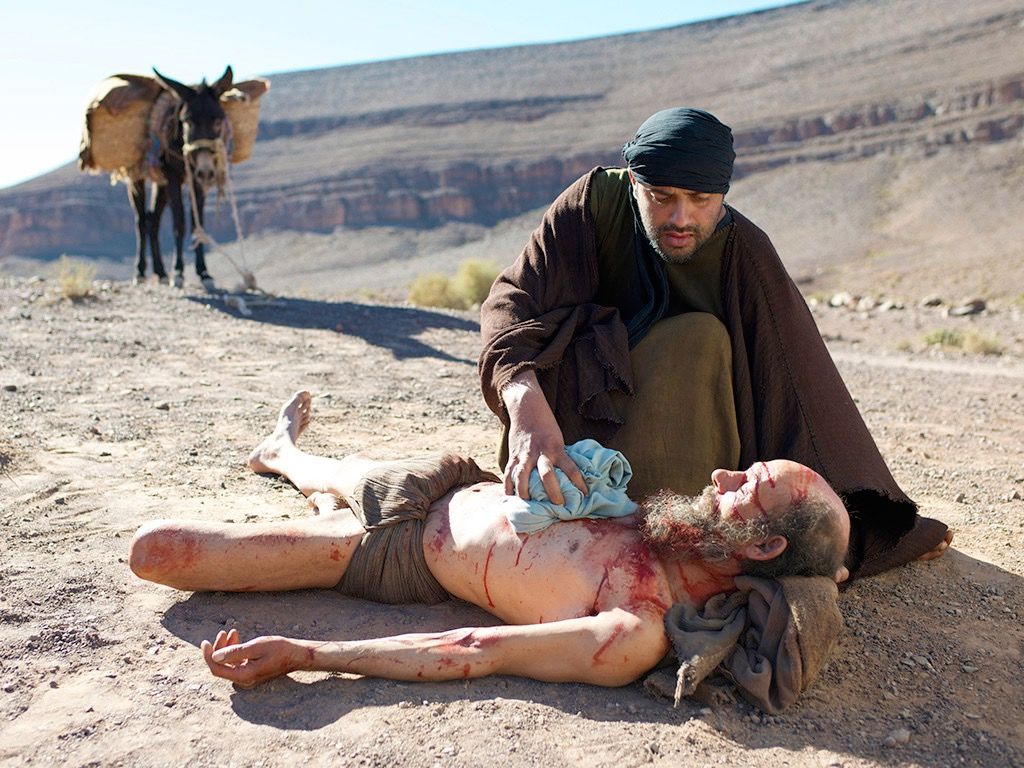Background Passages: Luke 10:25-37; Mark 12:28-34; Matthew 7:12
“What must I do to inherit eternal life?”
The question, shouted by an expert in the law, quieted the intimate conversation Jesus was having with the small crowd that gathered around the Galilean teacher. Heads turned toward the booming voice coming from the edge of the crowd. The man hiked up his flowing robe, pushed himself away from the large rock he leaned against, moving forward until he towered over Jesus who was sitting on a cedar log.
Jesus had noticed him skirting the periphery of the crowd for the past three days. Listening without hearing. Rolling his eyes. Biting his tongue. Biding his time. He was among a small group of Pharisees tracking Jesus from Jericho on his way to Jerusalem. They weren’t there to understand Jesus and his teaching. They were there to find fault in his words in an effort to discredit him in the eyes of the people.
Though the scribe asked a good question, it lacked in sincerity. Uttered by one who loved to hear his own voice. Seeking a specific answer. Hoping for something heretical. Jesus looked at the man for a moment and smiled. “What does the law say? How do you read it?” giving the man his moment in the spotlight.
The scribe turned to the crowd and confidently proclaimed, “Love the Lord your God with all your heart and with all your soul and with all your strength and with all your mind; and ‘love your neighbor as yourself.’” With a self-satisfied grin, he turned back to face Jesus, challenging him to disagree.
“You’re absolutely right,” Jesus answered. “Do this and you will have eternal life.” Jesus sat silently, his eyes never wavering from the eyes of the Pharisee. As the silence deepened, the scribe shuffled his feet. He did not get the answer he was expecting from the teacher. His eyes flashed as he fell back on his legal training, focusing his attack from a different angle. “Ahh, and just who is my neighbor?”
Jesus’ lips tightened and he let out a slow breath through his nostrils. For all he understood of God’s greatest commandments to his people, the lawyer limited its universal truth by qualify its spirit.
What Jesus speaks next is perhaps one of the most well-known parables he ever shared. The parable of the Good Samaritan transcends religious conversation, working its way into a secular context. Good Samaritan laws protect those who lend assistance in life-threatening situations. Those who go out of their way to help another are called good Samaritans.”
Here’s the gist of the story Jesus told.
A man traveling alone from Jerusalem to Jericho was attacked by robbers who beat him senseless and took his clothes and his money. They threw him in the ditch next to the road, bleeding , broken and near death. At separate times, a Jewish priest and a temple administrator happened upon the scene of the crime. They pretended not to see the man lying in the ditch. They averted their eyes, shuffled to the other side of the road and quickened their pace, ignoring the man in distress. Out of sight. Out of mind.
Later, a Samaritan on his way to Jericho came across the bleeding man. Compassion ruled the moment and the Samaritan jumped into the ditch to render aid. He cleaned the man’s cuts and bruises with his oil and wine and tore the hem of his garment to bandage the man’s wounds. He lifted the injured man onto his own donkey and walked him miles into the city. He took the man to an inn, nursing his needs throughout the night. The next morning, the Samaritan paid the innkeeper to watch over the man, promising to cover any additional costs the innkeeper incurred when the Samaritan returned.
Jesus told the story to the crowd gathered around him. He looked into the faces of every person around him. Finally, his eyes bore into the eyes of the scribe still standing in the middle. Jesus’ eyes narrowed and his voice lowered an octave. His next question landed like a heavy weight upon the man’s chest, crushing the breath from his lungs. “Which of these three do you think was a neighbor to the man who fell in to the hands of the robbers?”
I picture the man opening and closing his mouth like a fish out of water, fully aware that he had been outfoxed by the master teacher. His brain flashed in overdrive as he tried to think of a snappy comeback. Unable to give credit to a hated Samaritan, he answered in little more than a grudging whisper. “The one who showed mercy on him.”
The lengthy conversation between Jesus and the scribe must have inspired those who sat around and watched it unfold. The parable shared by Jesus subtly suggesting that faith is best demonstrated, not by grand theological arguments, but by the things we do for others. And, it is a message that echoes loudly today. A lesson I still need to learn at times.
Here’s the thing. The scribe asked a great question in the beginning. It is the fundamental question all of us who long for meaning in life should ask. “How do I find eternal life?” Ironically, he gave the same answer that Jesus gave to another group of Pharisees who questioned him about God’s greatest commandments (Mark 12:28-34). Had the man stopped to consider the meaning and spirit of the words he spoke, the whole conversation might have taken a different and better turn.
His second question, however, reveals an exclusionary faith. “Who is my neighbor?” is a question that seeks to limit our compassion…creating boundaries that give us an out. “Who is my neighbor?” suggests that some groups or some individuals are unworthy of my time and effort.
The scribe practiced a ritualized religion based on man-made rules that identified peoples that the law considered unclean and unworthy of God’s love. The Pharisees and scribes knew Jesus frequently associated with tax collectors, Samaritans, Gentiles, lepers, outcasts and outlaws. When the scribe asked his question, I suspect he hoped Jesus might identify as a neighbor one among this group of the unclean which Jewish law excluded from fellowship.
We often fall into the same trap as the scribe. Surely my “neighbor” only includes those people with whom I have a relationship…those who look like me…those who live in my social circle…my own racial subset, those for whom I can give money, but not get my hands dirty…those whose needs do not inconvenience me.
Jesus rejects that view. In Jesus’ parable, the Samaritan showed compassion and mercy to the injured man even though society considered the Samaritan an outcast and unworthy of God’s love. So, from Jesus’ standpoint, the question is not “Who is my neighbor,” but rather, “Whose neighbor can I be?”
It’s not a matter of identifying the person I wish to help. It’s a matter of looking for the unfolding opportunities God places before me where I can serve my God and my fellow man. Determining whose neighbor I can be demands that I step outside my comfort zone…insists that I engage with those whose backgrounds and cultures differ significantly from mine…mandates that I move past the safety of simple charitable giving to immerse myself in the gritty world of need in which others live.
Jesus defined our “neighbor” when he addressed the Pharisees in Mark. “Love your neighbor as you love yourself.” Find the definition also encompassed in the Golden Rule. “Do unto others (your neighbor) as you would have others do unto you.” Both verses suggest an empathy that allows us to see ourselves in the circumstances experienced by someone else. Except for the grace of God we could find ourselves in similar circumstances. That realization should compel us to provide the help and assistance to another in need that we desire in our most desperate times.
In essence Jesus asked the scribe to abandon the smooth road ritualized religion and live in the dirty ditch of practical and powerful faith. Forget about qualifying those we choose to help. Look instead for the chance to change the course of another’s life.
It’s a good question.
Whose neighbor can you be?
From the Author: If you would like to receive these devotional thoughts via email, simply subscribe to “The Searcher” by registering your email on the “Subscription” link on the right side of this page.









